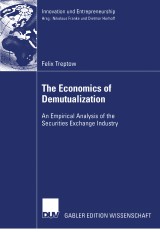Details

The Economics of Demutualization
An Empirical Analysis of the Securities Exchange IndustryInnovation und Entrepreneurship
|
53,49 € |
|
| Verlag: | Deutscher Universitätsverlag |
| Format: | |
| Veröffentl.: | 03.11.2007 |
| ISBN/EAN: | 9783835093119 |
| Sprache: | englisch |
| Anzahl Seiten: | 111 |
Dieses eBook enthält ein Wasserzeichen.
Beschreibungen
Whenever an economic institution is being transformed, researchers have an unusual opportunity to study causes and effects of the transformation and to test the economic theory related to the institution itself. Over the course of the last decade the global securities exchange industry has undergone such a tremendous change. Stock exchanges have demutualized and have turned into for-profit entities. Securities exchanges play a crucial role in modern market economies. They provide market participants with financial instruments of all sorts, serve as mechanism for price discovery and are an important source for external financing. Despite their important role, research covering the demutualization of stock exchanges has been sparse. Felix Treptow seeks to fill this gap in the literature and presents in this book an in depth analysis of the demutualization phenomenon. In his thesis, he applies advanced econometric methods to data sets which were assem bled specifically for the purpose of his analysis. Each of the three self-contained chapters of this volume addresses different issues which are of importance to the various stake holders in this process. The analysis covers the micro- and macroeconomic causes of demutualization, its impact on market liquidity and the changing relationship between exchanges and issuers.
Stock Exchanges and Issuers: A Changing Relationship.- The Determinants of Demutualization.- The Impact of Demutualization.
Dr. Felix Treptow ist wissenschaftlicher Assistent von Prof. Dietmar Harhoff, Ph. D., am Institut für Innovationsforschung, Technologiemanagement und Entrepreneurship der Universität München.
The securities exchange industry is in a state of flux. Exchanges constantly develop new revenue sources and products, try to expand their market share through fierce competition and pursue the consolidation of the industry. A prerequisite for this development was their transformation into market-oriented for-profit entities that are dominated by outside investors. This process is commonly referred to as demutualization. <br>
<br>
In order to understand the current developments in the securities exchange industry, Felix Treptow examines the changing relationship between exchanges and issuers, analyses the micro- and macroeconomic drivers of the demutualization decision, and investigates its impact on market liquidity. He presents a detailed analysis of both the determinants as well as the consequences of the demutualization of securities exchanges. <br>
<br>
<br>
In order to understand the current developments in the securities exchange industry, Felix Treptow examines the changing relationship between exchanges and issuers, analyses the micro- and macroeconomic drivers of the demutualization decision, and investigates its impact on market liquidity. He presents a detailed analysis of both the determinants as well as the consequences of the demutualization of securities exchanges. <br>
<br>
The securities exchange industry is in a state of flux. Exchanges constantly develop new revenue sources and products, try to expand their market share through fierce competition and pursue the consolidation of the industry. A prerequisite for this development was their transformation into market-oriented for-profit entities that are dominated by outside investors. This process is commonly referred to as demutualization. <br>
<br>
In order to understand the current developments in the securities exchange industry, Felix Treptow examines the changing relationship between exchanges and issuers, analyses the micro- and macroeconomic drivers of the demutualization decision, and investigates its impact on market liquidity. He presents a detailed analysis of both the determinants as well as the consequences of the demutualization of securities exchanges. <br>
<br>
<br>
In order to understand the current developments in the securities exchange industry, Felix Treptow examines the changing relationship between exchanges and issuers, analyses the micro- and macroeconomic drivers of the demutualization decision, and investigates its impact on market liquidity. He presents a detailed analysis of both the determinants as well as the consequences of the demutualization of securities exchanges. <br>
<br>
Diese Produkte könnten Sie auch interessieren:

The Impact of Inflation and Monetary Policy Shocks on Stock Market Performance in Zimbabwe

von: Mkhululi Ncube

29,99 €
















